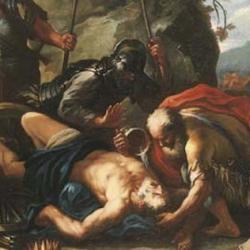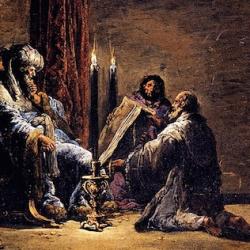When Israel conquered and settled in Canaan, two and a half tribes settled on the eastern side of the Jordan, in “transJordanian” territory – Reuben, Gad, and half of the tribe of Manasseh, the son of Joseph. The Chronicler treats these three tribes as a complex unit in 1 Chronicles 5.
Structurally, the chapter is essentially chiastic:
A. Reuben’s genealogy, vv. 1-10
B. Gad’s genealogy, vv. 11-17
C. War of Reuben, Gad, and Manasseh against the Hagrites, vv. 18-22
B’. Manasseh’s genealogy, vv. 23-24
A’. Exile of Reuben, Gad, and Manasseh, vv. 25-26
There are various links among these sections. The A, C, and A’ sections all refer to Reuben, but the B sections do not. In both A and A’, the Chronicler refers to the conquest of the transJordan tribes by the Assyrians under Tiglath-pilneser (or Pul). The central section describing the war against the descendants of Hagar (cf. Psalm 83) in the days of Saul is anticipated with a brief mention in v. 10. Initially, it seems that Reuben is the only tribe to fight the Hagrites, but after Gad is introduced we learn that Gad joined Reuben in the war. And more: even before Manasseh has been introduced, he is fighting alongside Reuben and Gad. Thus:
a. Reubenites fight Hagrites, v. 10
b. Genealogy of Gad, vv. 11-17
a’. Reuben, Gad, and Manasseh v. the Hagrites, vv. 18-22 (first reference to Manasseh)
b’. Genealogy of Manasseh, vv. 23-24
Reuben fights, the Gad is introduced; Reuben, Gad and Manasseh fight, and then Manasseh is introduced.
The frame sections and the center highlight the theological thrust of the genealogy. In the opening verses, the Chronicler provides a brief summary of Reuben’s fall from preeminence among his brothers. Because he “defiled his father’s bed” (v. 1; Genesis 35:22), he loses the birthright, the double portion that was instead given to Joseph (his two sons each received a tribal inheritance). Yet Joseph wasn’t preeminent in power; Judah became strong and took the lead, though the birthright remained with Joseph. As Sara Japhet puts it, there are three tiers of preeminence here – “the biological firstborn, the legally nominated elder, and the one who wielded actual authority” (I and II Chronicles, 133). At the end of the passage, Reuben is again deprived of inheritance, since, along with Gad and Manasseh, the Reubenites “played the harlot after the gods of the peoples of the land” (v. 25). Actual sexual transgression is matched by spiritual adultery. The first deprives Reuben of his inheritance; the latter leads to the tribe’s complete (permanent?) expulsion from the land.
At the center of the chapter is a “might have been” scenario, a story of heroic faithfulness by the very tribes that later turned from Yahweh to follow the gods of the nations. The transJordan tribes don’t merely win a battle; they win because they “cried out to God” and “trusted Him,” so that “He was entreated for them” (v. 20). In a rather stunning formulation, we learn that “many fell slain” because the “war was of God”: A divine war leaves many dead. The episode is a small-scale conquest story, a story of divine aid in battle followed by settlement, a small-scale Joshua. And the sequel is also the story of all Israel, of unfaithfulness in the land and eventual expulsion. For the Chronicler, the promise of divine help remains in force: If those who return will cry out to Yahweh, He will help them once again.















